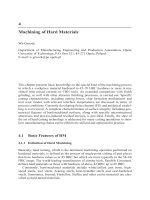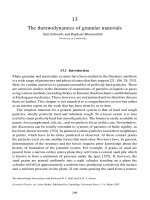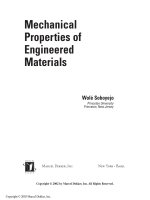ASTM D2-08 Abrasion Of Road Material
Bạn đang xem bản rút gọn của tài liệu. Xem và tải ngay bản đầy đủ của tài liệu tại đây (75.1 KB, 2 trang )
AMERICAN SOCIETY FOR TESTING MATERIALS
PHILADELPHIA, PA., U. S. A.
AFFILIATED WITH THE
International Assocmtion for Testing Materials.
STANDARD TEST
FOR
ABRASION OF ROAD MATERIAL.
Serial Designation: D 2-08.
This test is issued under the fixed designation D 2; the final number
indicates the year of original issue, or in the case of revision, the year of last
revision.
Adopted, 1908,
This well-known test is similar in almost all respects to the
Deval abrasion test of the French School of Roads and Bridges.
It has been used since 1878, and is entirely satisfactory for the
purpose for which it was designed.
Abrasion Test.
The machine shall consist of one or more hollow iron cylin-
ders; closed at one end and furnished with a tightly fitting iron
cover at the other; the cylinders to be 20 cm. in diameter and
34 cm. in depth, inside. These cylinders are to be mounted on
a shaft at an angle of 30 deg. with the axis of rotation of the
shaft.
At least 30 lb. of coarsely broken stone shall be available
for a test. The rock to be tested shall be broken in pieces as
nearly uniform in size as possible, and as nearly 50 pieces as
possible shall constitute a test sample. The total weight of
(524)
Serial Designation: D 2-08. 525
rock in a test shall be within 10 g. of 5 kg. All test pieces shall
be washed and thoroughly dried before weighing. Ten thousand
revolutions, at the rate of between 30 and 33 per minute, shall
constitute a test. Only the percentage of material worn off
which will pass through a 0.16-cm. (j^-in.) mesh sieve shall be
considered in determining the amount of wear. This may be
expressed either as the percentage of the 5 kg. used in the test,
or the French coefficient, which is in more general use, may be
WW— given: that is, coefficient of wear = 20 X — = , where w is the
weight in grams of the detritus under 0.16 cm. (-^ in.) in size
per kilogram of rock used.









